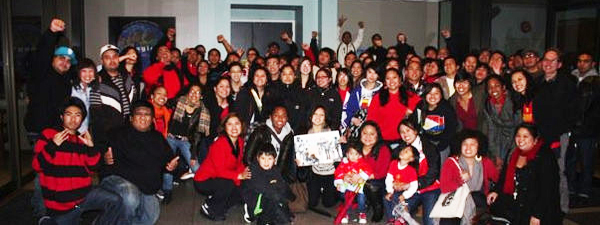|
Can't see this email? View in Browser
Support the Expansion of Ethnic Studies in SFUSD!
 In 2010, hundreds of students, from diverse communities of color across San Francisco, organized to win Ethnic Studies classes in SFUSD. As a result of their efforts, The SF Board of Ed passed a resolution to pilot a 9th grade Ethnic Studies course in five High Schools. In 2010, hundreds of students, from diverse communities of color across San Francisco, organized to win Ethnic Studies classes in SFUSD. As a result of their efforts, The SF Board of Ed passed a resolution to pilot a 9th grade Ethnic Studies course in five High Schools.
Since the passage of the 2010 Resolution, students, teachers, community organizers and advocates have been collaborating to build curriculum and plan for the expansion of Ethnic Studies in the district. BOE Commissioner Sandra Fewer has sponsored a new Resolution to institutionalize Ethnic Studies in ALL high schools and ensure that EVERY high school student has the opportunity to take an Ethnic Studies class by the school year 2015/16.
Be a part of history and support the resolution to get Ethnic Studies in all SFUSD Schools!
Two things you can do to support:
1) Click here to sign the petition calling for the expansion of Ethnic Studies to ALL high schools in the San Francisco Unified School District.
2) Join us tomorrow at the Board of Education to support the Resolution for Institutionalizing Ethnic Studies in SFUSD.
When: Tuesday December 9th 6pm
Where: Board of Education 555 Franklin @ McAllister
The Case for Ethnic Studies

Ethnic Studies arose as a counter to the traditional mainstream curriculum, which continues to marginalize scholarship by and about African Americans, Latino/as, Native Americans, Asian Americans, Pacific Islanders, and other groups. As students of color go through the school system, the curriculum’s overwhelming whiteness disengages many from academic learning. Many researchers have challenged the notion of the achievement gap, and reframed it as an ‘‘opportunity gap’’. Both curriculum and pedagogy play a role in this opportunity gap, as students of color are not receiving an education that reflects their realities. It has also been consistently demonstrated that Ethnic Studies, a curriculum that does reflect the experiences of students of color, has a positive impact on student academic engagement, achievement, and empowerment, especially when linked with culturally responsive teaching grounded in high academic expectations.
Providing students with an education guided by a social justice framework, which places their stories in the center of the dialogue allows them to self-reflect critically and develop agency over their education. Through the examination of counterstories and often times neglected narratives of all people, students learn to humanize and respect themselves, their families, and their communities. Students think critically about race, ethnicity, and culture in the context of their own identities and their lived experiences. Ethnic Studies also provides students with the critical lens necessary to analyze oppression and engage in transformational resistance through learning service projects. These courses are critical in students’ growth in addressing issues in their own lives and making positive change in their communities.
Approximately 90% of SFUSD students are students of color and yet the curriculum remains largely Eurocentric. The SFUSD Ethnic Studies curriculum developed by SFUSD teachers fosters strong ties between students and their families, neighborhoods, and schools, and encourages a sense of civic engagement and social responsibility. It explores specific aspects of identity on personal, interpersonal and institutional levels and provides students with interdisciplinary reading, writing and analytical skills. Ethnic Studies has been approved as an A-G course by the University of California and SFUSD students have and continue to gain college level credit from San Francisco State University upon completion of an Ethnic Studies class during their junior or senior year.
Earlier this month, the Los Angeles Unified School District passed a resolution to make Ethnic Studies a Graduation requirement in their schools, and now it is San Francisco’s turn!
To learn more about K-12 Ethnic studies history, research, impact, and policy implications, check out this 2014 paper published in the Urban Review.
Shopping for your holiday gifts?
|
Coleman Advocates for Children and Youth
|
|